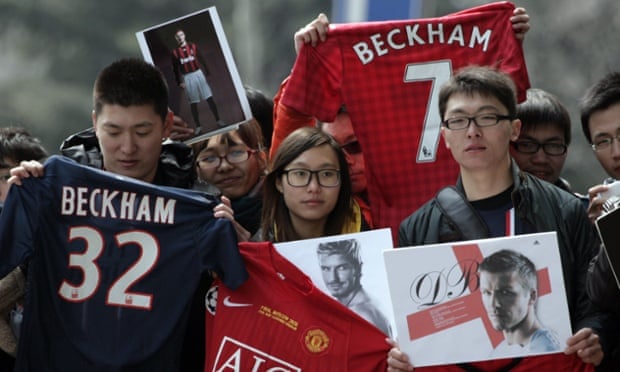China has set out its aim of hosting a World Cup
and raising the competitiveness of the national team in a sweeping
policy document that seeks to revitalise a sport damaged by match-fixing
scandals and poor performances on the pitch.
China has worked since 2009 to promote grassroots football and crush illegal gambling syndicates, but its soccer reform and development plan says: “Our football is still lagging compared to the rapid development in Asia and the world.”
The plan has been approved by President Xi Jinping, an avid football enthusiast.
It says China’s short-term goal is to “improve the environment and atmosphere” of the sport, and that the country will focus on attracting younger players.
In the long term it aims for mass participation in football, with the creation of an “advanced” league system in China, to help improve the international competitiveness of the national men’s team.
It would also “proactively apply to host the World Cup”, it says.
China reached the quarter-finals of the Asian Cup in Australia in January after winning all three of their group matches, a performance the country’s anti-corruption watchdog called a direct result of a gambling crackdown.
The campaign against soccer corruption has seen at least nine officials, four judges, 13 footballers or coaches and 17 club workers jailed or punished since 2009.
China’s national team are now ranked 83rd in the world, the seventh-best in Asia. They have qualified for the final stages of a World Cup only once, in 2002.
China’s plan showed its commitment to becoming a football powerhouse, but reform would not be easy, said Cameron Wilson, editor of Wild East Football, a website covering Chinese soccer.
“It shows they are deadly serious about it, but the problems inside Chinese football are deeply ingrained,” he said.
China has worked since 2009 to promote grassroots football and crush illegal gambling syndicates, but its soccer reform and development plan says: “Our football is still lagging compared to the rapid development in Asia and the world.”
The plan has been approved by President Xi Jinping, an avid football enthusiast.
It says China’s short-term goal is to “improve the environment and atmosphere” of the sport, and that the country will focus on attracting younger players.
In the long term it aims for mass participation in football, with the creation of an “advanced” league system in China, to help improve the international competitiveness of the national men’s team.
It would also “proactively apply to host the World Cup”, it says.
China reached the quarter-finals of the Asian Cup in Australia in January after winning all three of their group matches, a performance the country’s anti-corruption watchdog called a direct result of a gambling crackdown.
The campaign against soccer corruption has seen at least nine officials, four judges, 13 footballers or coaches and 17 club workers jailed or punished since 2009.
China’s national team are now ranked 83rd in the world, the seventh-best in Asia. They have qualified for the final stages of a World Cup only once, in 2002.
China’s plan showed its commitment to becoming a football powerhouse, but reform would not be easy, said Cameron Wilson, editor of Wild East Football, a website covering Chinese soccer.
“It shows they are deadly serious about it, but the problems inside Chinese football are deeply ingrained,” he said.

Aucun commentaire:
Enregistrer un commentaire